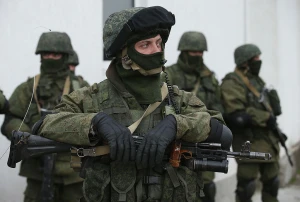
Dossier accusing Russia of causing famine in Ukraine will be submitted to ICC
A foreign law firm working with Ukraine's Prosecutor's Office, is readying a dossier detailing Russian war crimes for submission to the International Criminal Court. It accuses Russia of deliberately causing famine during the war
The Guardian reported the information.
Lawyers are documenting cases where Russian invaders used hunger as a weapon of war, adding evidence to enable the International Criminal Court to launch the first prosecution in this regard and indict Russian leader Vladimir Putin.
Global Rights Compliance is working with the Ukrainian prosecutor's office until the end of next year to compile a dossier for submission under Article 15 of the Rome Statute. The lawyers will try to identify the criminals, in particular, whether to request an indictment of Putin, as was the case in March, when the International Criminal Court issued an arrest warrant for the president for leading the "illegal deportation" of Ukrainian children to Russia from the occupied territories of Ukraine. Lawyers are working with intelligence to detail examples of war crimes and participate in damage analysis.
Three phases of Russia weaponizing food
Yousuf Khan, a senior lawyer with Global Rights Compliance, a law firm that is working with Ukrainian prosecutors, said that "the weaponisation of food has taken place in three phases," starting with the initial invasion, when Ukrainian cities were under siege and food supplies were cut off.
Investigators are particularly focused on the siege of Mariupol, Khan added. Food supplies to the city were cut off, humanitarian aid corridors were blocked or bombed, making it very difficult or impossible for starving civilians to escape. The incident of the death of 20 civilians in Chernihiv on the morning of March 16, 2022, when Russian fragmentation bombs exploded near a supermarket in the city, where Ukrainians were standing in line for bread and food, was also documented.
The second stage was the destruction of food and water supplies, as well as energy sources throughout Ukraine, which the lawyer called "objects indispensable to the survival of the civilian population."
These attacks were “not crimes of result, but crimes of intent,” because “if you are taking out objects that civilians need, like energy infrastructure in the dead of winter, there is a foreseeability to your actions,” Khan emphasized.
In Mykolaiv, the residents faced a dire situation at the start of the war as Russian troops took control of a pumping station, leaving them without access to drinking water. People had to depend on water deliveries for their safe consumption and hygiene needs.
The third phase was Russia's attempts to restrict Ukrainian food exports.
"Then we’ve seen Russia attack grain facilities on the Danube and engage in muscle flexing on the Black Sea," Khan said, referring to reports by Ukrainian officials that 270,000 tons of food was destroyed in late July and early August last year.
-
On September 24, the lower house of the Canadian parliament unanimously passed a resolution condemning the deportation of Ukrainian children to Russia, calling such actions war crimes and genocide on Russia’s part.
- News














































